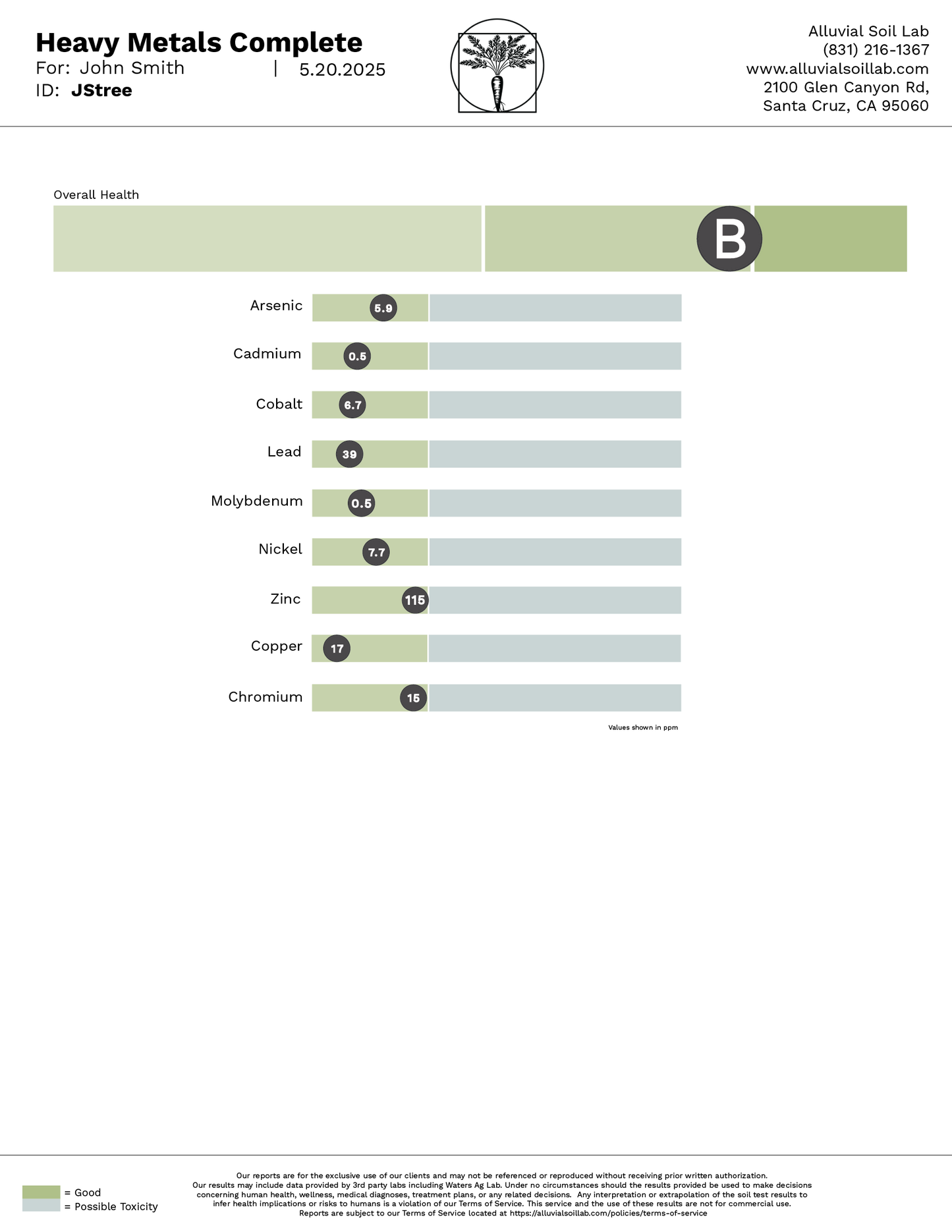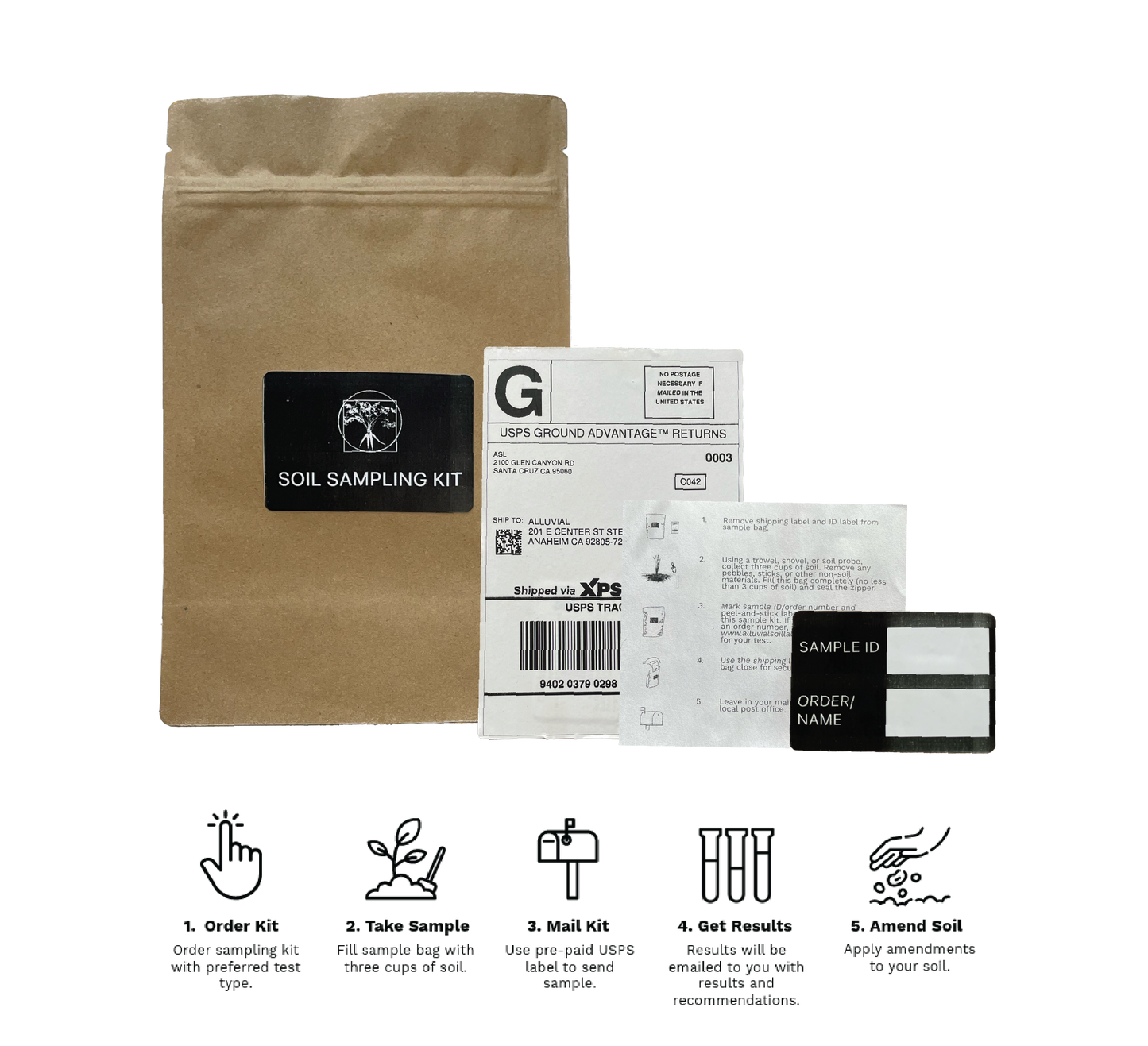Heavy Metals
Heavy Metals
Assesses the concentration of various heavy metals present in soil. Testing for heavy metals can provide valuable information for gardeners, farmers, and environmental scientists, helping them make informed decisions about soil management, crop selection, and potential environmental risks.
Couldn't load pickup availability
- Fast Turnaround Time
- Accurate Results
- Secure PCI/SSL Payment
- 30-Day Refunds
- Expert Recommendations
- Sustainable Packaging
Ensure safe gardening with our Heavy Metals Soil Test, analyzing lead, arsenic, cadmium, and more for healthy soil. Order your kit for precise results.
Report Includes
- Graphs and Data Analysis: Detailed visuals to understand heavy metal concentrations.
- 15-Minute Phone Consultation: Discuss results with a soil scientist from Alluvial Soil Lab for tailored soil management.
Sources of Heavy Metals in Soil
Heavy metals like cadmium, chromium, cobalt, copper, lead, molybdenum, nickel, zinc, and arsenic enter soil via natural processes (e.g., rock weathering) and human activities (e.g., industrial emissions, mining, fertilizers, pesticides, urban runoff). Wildfires also deposit metals through ash, impacting soil quality and ecosystem health.
Impact on Plants
Essential metals (copper, zinc, molybdenum) support plant growth in small amounts, aiding enzyme activation and nutrient metabolism. Excessive levels can disrupt roots, reduce nutrient uptake, and lower vigor. Toxic metals (lead, cadmium, arsenic) stunt growth, inhibit germination, and harm plant tissues, reducing yields and soil suitability for agriculture.
Bioaccumulation and Cleanup
Some plants bioaccumulate heavy metals, posing risks to food safety but enabling phytoremediation, where plants like sunflowers absorb metals for removal. Other methods include soil amendments to bind metals, pH adjustments to reduce solubility, or soil replacement for severe contamination. Testing identifies the best remediation strategy.
Safeguard your garden with our Heavy Metals Soil Test. Contact us at (831) 216-1367 for expert soil lead testing guidance.
Sampling instructions
Sampling instructions
Materials Needed
i. Clean plastic bucket
ii. Shovel or soil probe
iii. Plastic bag
iv. Labeling materials (marker, tape, or label)
v. Gloves & mask (for contaminated soils)
Sampling Process
Step 1: Define Sampling Area
i. Identify the specific area for testing.
ii. Collect one composite sample per 1,000 sq. ft.
Step 2: Collect Soil Samples
i. Use a clean bucket and shovel/probe to gather soil from three spots.
ii. Dig 6 inches deep, taking a vertical slice.
iii. Avoid compost piles, pet waste, or fertilized areas.
iv. Do not sample wet soil.
Step 3: Prepare Sample
i. Remove debris, break up clumps, and mix soil thoroughly.
Step 4: Package Sample
i. Measure 3 cups of mixed soil into a resealable plastic bag.
ii. Label with Sample ID, Test Type, and Order Number.
Step 5: Submit Sample
i. Purchase a test on our website.
ii. Mail to Alluvial Soil Lab, 201 E Center St, Ste 112-3083, Anaheim, CA 92805.
iii. Use any postal carrier.
For Soil Sample Kit Users
Step 1: Prepare Kit
i. Remove shipping label, ID tag, and instructions.
Step 2: Collect & Package Sample
i. Follow the standard collection process.
ii. Fill the provided bag completely.
iii. Attach the ID tag and secure the shipping label.
Turnaround and Results
i. Timing depends on test type.
ii. Results emailed with soil composition, nutrients, and recommendations.
Safety Precautions
i. Wear gloves/mask when handling potentially contaminated soil.
ii. Wash hands thoroughly after sampling.
Following these steps ensures accurate soil testing for better gardening decisions.
Advanced details
Advanced details
Turnaround time is approximately 3-7 business days



Reviews
-

Jack Algiere | Stone Barns Center
Verified Purchase ✓
Alluvial Soil Lab provided us with comprehensive tests for our organic soil based greenhouse. The results were easy to read and will surely be a great tool for anyone looking to better understand their own soils.
-

Wilson H.
Verified Purchase ✓
I recently started a garden at a community plot, and wanted to know what was in my soil, so I could make more targeted amendments. Jake walked me through how to do so, and after sending my samples in... (read more)
-

Noah M.
Verified Purchase ✓
As a professional in the field I very much appreciate the timely and detailed report, along with skilled follow up communications. I will certainly use Alluvial Soil Lab's services again.
-

Zakary S.
Verified Purchase ✓
Great support and detailed report. Helped advise what options we had to plant trees! Plants are doing incredible! (read more)
-

Peggy C.
Verified Purchase ✓
I recently moved to a property with a vineyard, and wanted to know what type of fertilizers to use and how much to apply. So I did a soil test. I was new to soil testing and with Jake's help and instructions, I was able to successfully collect… (read more)
-

Adrian T.
Verified Purchase ✓
Alluvial makes complex scientific lab results accessible and legible for anyone.(read more)
-

Tom R.
Verified Purchase ✓
I wanted to start a vineyard on my land in Alpine, Ca. Unfortunately, it’s mostly clay. I contacted Alluvial and sent a soil sample...received a land rating with nutrient advice...the first test rows thrived, allowing me to plant more this Spring. Thank you! Couldn’t have done it without you. (read more)




